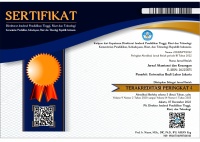Analisis Pengaruh Ukuran Perusahaan, Profitabilitas, Leverage, Kepemilikan Institusional dan Kepemilikan Manajerial terhadap Carbon Emission Disclosure
Abstract
Keywords
Full Text:
PDFReferences
Bambang Riyanto. (2008). Dasar-Dasar Pembelanjaan Perusahaan: Vol. Cetakan Kedepalan (Edisi Keempat). Yogyakarta: Yayasan Penerbit Gajah Mada.
Bappenas. (2021). Ringkasan Ekslusif: Kebijakan Pembangunan Berketahanan Iklim (Climate Resilience Development Policy) 2020-2021.
Borghei-Ghomi, Z., & Leung, P. (2013). An Empirical Analysis of the Determinants Greenhouse Gas Voluntary Disclosure in Australia. Account Financ, 2. http://dx.doi.org/10.5430/afr.v2n1p110
Chariri, A., & Ghozali, I. (2007). Teori Akuntansi. Semarang: Badan Penerbit Universitas Diponegoro, 409.
Chithambo, L., & Tauringana, V. (2014). Company Specific Determinants of Greenhouse Gases Disclosures. Journal of Applied Accounting Research. https://doi.org/10.1108/JAAR-11-2013-0087
Choi, B. B., Lee, D., & Psaros, J. (2013). An analysis of Australian Company Carbon Emission Disclosures. Pacific Accounting Review. https://doi.org/10.1108/011405813
Deegan, C., Rankin, M., & Tobin, J. (2002). An Examination of the Corporate Social and Environmental Disclosures of BHP from 1983‐1997: A Test of Legitimacy Theory. Accounting, Auditing & Accountability Journal. https://doi.org/10.1108/09513570210435861
Dowling, J., & Pfeffer, J. (1975). Organizational Legitimacy: Social Values and Organizational Behavior. Pacific Sociological Review, 18(1), 122–136. https://doi.org/10.2307/1388226
Freeman, R. E. (1984). Strategic Management: A Stakeholder Approach. Cambridge University Press.
Gray, R., Kouhy, R., & Lavers, S. (1995). Corporate Social and Environmental Reporting: A Review of the Literature and a Longitudinal Study of UK Disclosure. Accounting, Auditing Accountability Journal, 47–77. https://doi.org/10.1108/09513579510146996
IAI. (2013). ED PSAK 1: Penyajian Laporan Keuangan (Revisi 2013).
IEA. (2022). Global Energy Review: CO2 Emissions in 2021 Global Emissions Rebound Sharply to Highest Ever Level. www.iea.org/t&c/
IPCC. (2007). Climate Change 2007: Impacts, Adaptation and Vulnerability. Cambridge Unive Press.
IPCC. (2014). Climate change 2014: Mitigation of Climate Change: Working Group III Contribution to the Fifth Assessment Report of the Intergovernmental Panel on Climate Change.
Jannah, R., & Muid, D. (2014). Analsis Faktor-Faktor yang Mempengaruhi Carbon Emission Disclosure pada Perusahaan di Indonesia (Studi Empiris pada Perusahan yang Terdaftar di Bursa Efek Indonesia Periode 2010-2012). Diponegoro Journal of Accounting, 3(2), 1000–1010. https://ejournal3.undip.ac.id/index.php/accounting/article/view/6164
Luo, L., Tang, Q., & Lan, Y. (2013). Comparison of Propensity for Carbon Disclosure Between Developing and Developed Countries: A Resource Constraint Perspective. Accounting Research Journal, 26(1), 6–34. https://doi.org/10.1108/ARJ-04-2012-0024
NASA Climate Change. (2021). Global Temperature Index (C). https://climate.nasa.gov/vital-signs/global-temperature/
Presiden Republik Indonesia. (1994). Undang-Undang Republik Indonesia Nomor 6 Tahun 1994 Tentang Pengesahan United Nations Framework Convention on Climate Change (Konvensi Kerangka Kerja Perserikatan Bangsa-Bangsa Mengenai Iklim).
Pemerintah Indonesia. (2004). Undang-Undang Republik Indonesia Nomor 17 Tahun 2004 Tentang Pengesahan Kyoto Protocol to The United Nations Framework Convention on Climate Change (Protokol Kyoto atas Konvensi Kerangka Kerja Perserikatan Bangsa-Bangsa tentang Perubahan Iklim). Lembaran Negara RI Tahun 2004, No. 72. Sekretariat Negara. Jakarta.
Pemerintah Indonesia. (2011). Peraturan Presiden Republik Indonesia Nomor 61 Tahun 2011 Tentang Rencana Aksi Nasional Penurunan Emisi Gas Rumah Kaca. Sekretariat Negara. Jakarta.
Pemerintah Indonesia. (2016). Undang-Undang Republik Indonesia Nomor 16 Tahun 2016 Tentang Pengesahan Paris Agreement to The Unitend Nations Framework Convention on Climate Change (Persetujuan Paris atas Konvensi Kerangka Kerja Perserikatan Bangsa-Bangsa Mengenai Perubahan Iklim). Lembaran Negara RI Tahun 2016, No. 204. Sekretariat Negara. Jakarta.
Soerono, A. N., Tjahjono, M. E. S., & Sutjipto, H. (2019). Pengaruh Media Richness terhadap User Trust dan Persepsi Corporate Social Responsibility. JAK (Jurnal Akuntansi) Kajian Ilmiah Akuntansi, 6(1), 20–38. https://doi.org/10.30656/jak.v6i1.9
Ullmann, A. A. (1985). Data in Search of a Theory: A Critical Examination of the Relationships Among Social Performance, Social Disclosure, and Economic Performance of US Firms. Academy of Management Review, 10(3), 540–557. https://doi.org/10.5465/amr.1985.4278989
DOI: https://doi.org/10.36080/jak.v12i2.2273
Refbacks
- There are currently no refbacks.

This work is licensed under a Creative Commons Attribution 4.0 International License.
Fakultas Ekonomi dan Bisnis, Program Studi Akuntansi. Universitas Budi Luhur, Jl. Ciledug Raya, Petukangan Utara, Jakarta Selatan, DKI Jakarta 12260, Indonesia

This work is licensed under a Creative Commons Attribution 4.0 International License.












